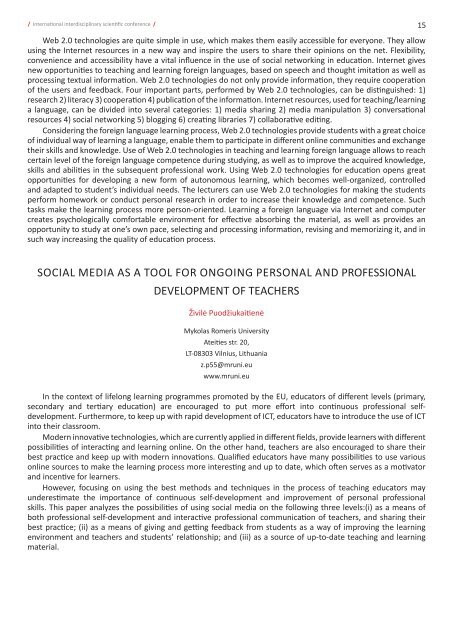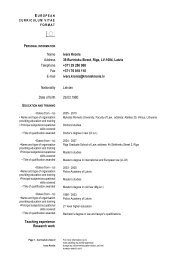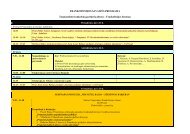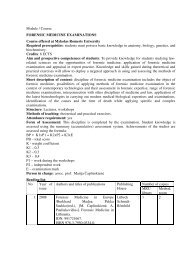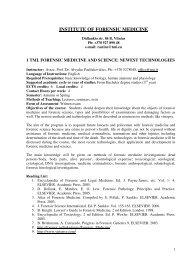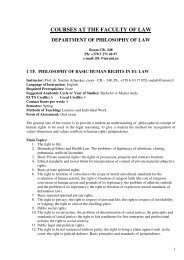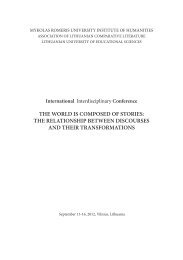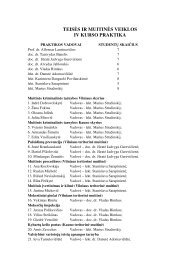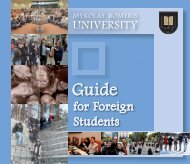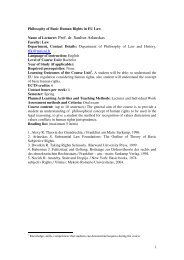SOCIAL MEDIA: CHALLENGES AND OPPORTUNITIES FOR ...
SOCIAL MEDIA: CHALLENGES AND OPPORTUNITIES FOR ...
SOCIAL MEDIA: CHALLENGES AND OPPORTUNITIES FOR ...
Create successful ePaper yourself
Turn your PDF publications into a flip-book with our unique Google optimized e-Paper software.
International interdisciplinary scientific conference /<br />
Web 2.0 technologies are quite simple in use, which makes them easily accessible for everyone. They allow<br />
using the Internet resources in a new way and inspire the users to share their opinions on the net. Flexibility,<br />
convenience and accessibility have a vital influence in the use of social networking in education. Internet gives<br />
new opportunities to teaching and learning foreign languages, based on speech and thought imitation as well as<br />
processing textual information. Web 2.0 technologies do not only provide information, they require cooperation<br />
of the users and feedback. Four important parts, performed by Web 2.0 technologies, can be distinguished: 1)<br />
research 2) literacy 3) cooperation 4) publication of the information. Internet resources, used for teaching/learning<br />
a language, can be divided into several categories: 1) media sharing 2) media manipulation 3) conversational<br />
resources 4) social networking 5) blogging 6) creating libraries 7) collaborative editing.<br />
Considering the foreign language learning process, Web 2.0 technologies provide students with a great choice<br />
of individual way of learning a language, enable them to participate in different online communities and exchange<br />
their skills and knowledge. Use of Web 2.0 technologies in teaching and learning foreign language allows to reach<br />
certain level of the foreign language competence during studying, as well as to improve the acquired knowledge,<br />
skills and abilities in the subsequent professional work. Using Web 2.0 technologies for education opens great<br />
opportunities for developing a new form of autonomous learning, which becomes well-organized, controlled<br />
and adapted to student’s individual needs. The lecturers can use Web 2.0 technologies for making the students<br />
perform homework or conduct personal research in order to increase their knowledge and competence. Such<br />
tasks make the learning process more person-oriented. Learning a foreign language via Internet and computer<br />
creates psychologically comfortable environment for effective absorbing the material, as well as provides an<br />
opportunity to study at one’s own pace, selecting and processing information, revising and memorizing it, and in<br />
such way increasing the quality of education process.<br />
<strong>SOCIAL</strong> <strong>MEDIA</strong> AS A TOOL <strong>FOR</strong> ONGOING PERSONAL <strong>AND</strong> PROFESSIONAL<br />
DEVELOPMENT OF TEACHERS<br />
Živilė Puodžiukaitienė<br />
Mykolas Romeris University<br />
Ateities str. 20,<br />
LT-08303 Vilnius, Lithuania<br />
z.p55@mruni.eu<br />
www.mruni.eu<br />
In the context of lifelong learning programmes promoted by the EU, educators of different levels (primary,<br />
secondary and tertiary education) are encouraged to put more effort into continuous professional selfdevelopment.<br />
Furthermore, to keep up with rapid development of ICT, educators have to introduce the use of ICT<br />
into their classroom.<br />
Modern innovative technologies, which are currently applied in different fields, provide learners with different<br />
possibilities of interacting and learning online. On the other hand, teachers are also encouraged to share their<br />
best practice and keep up with modern innovations. Qualified educators have many possibilities to use various<br />
online sources to make the learning process more interesting and up to date, which often serves as a motivator<br />
and incentive for learners.<br />
However, focusing on using the best methods and techniques in the process of teaching educators may<br />
underestimate the importance of continuous self-development and improvement of personal professional<br />
skills. This paper analyzes the possibilities of using social media on the following three levels:(i) as a means of<br />
both professional self-development and interactive professional communication of teachers, and sharing their<br />
best practice; (ii) as a means of giving and getting feedback from students as a way of improving the learning<br />
environment and teachers and students’ relationship; and (iii) as a source of up-to-date teaching and learning<br />
material.<br />
15


